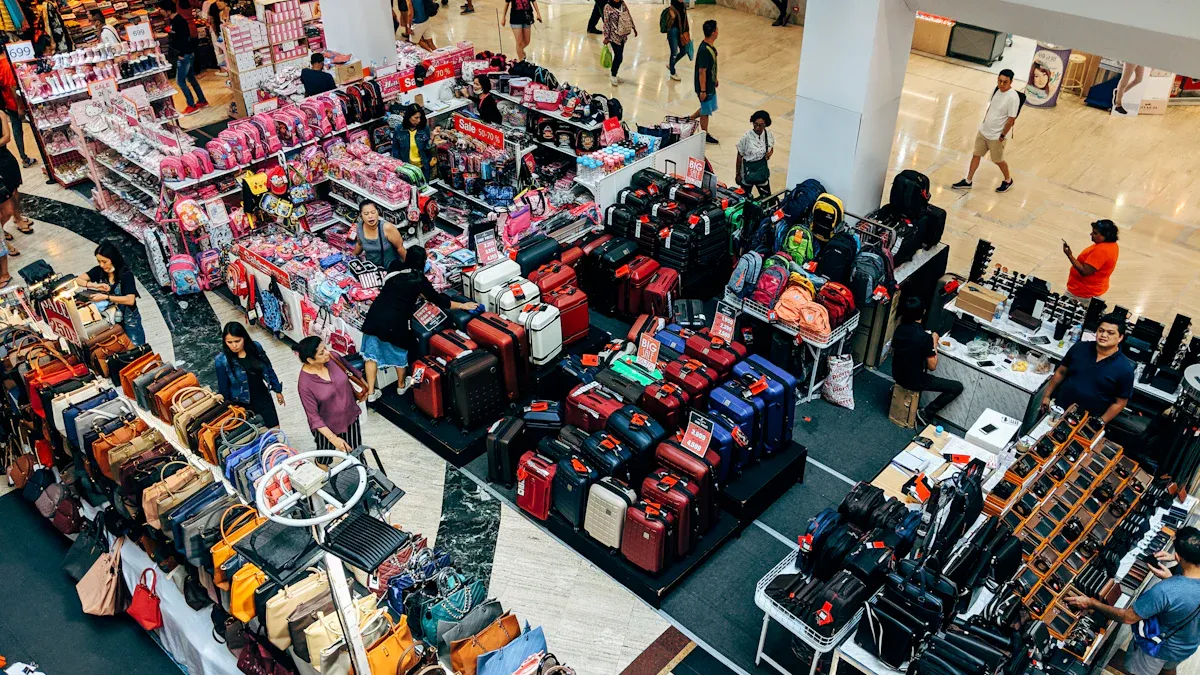The Importance of Bulk Order Discounts and Payment Terms When Buying from China

When you buy wholesale from China, bulk order discounts and payment terms play a crucial role in boosting profitability. Bulk orders reduce per-unit costs, enhancing cost efficiency. Favorable payment terms help you manage cash flow and minimize financial risks. However, balancing these benefits with inventory management is essential to avoid overstocking challenges.
Key Takeaways
Buying in bulk lowers the cost of each item. Use these savings to make your business more competitive.
Good payment plans help you handle your money better. Agree on terms that match your budget to stay steady when buying a lot.
Being friendly with suppliers builds trust. Trust can get you better deals and easier trades, helping your business grow over time.
Understanding Bulk Order Discounts

What Are Bulk Order Discounts?
Bulk order discounts are price reductions offered by suppliers when you purchase large quantities of goods. These discounts incentivize buyers to place bigger orders, allowing suppliers to streamline production and reduce operational costs. When you buy wholesale from China, these discounts can significantly lower your per-unit costs, making your business more competitive in the market.
Benefits of Buying in Bulk
Buying in bulk offers several financial and operational advantages:
It enables you to take advantage of volume discounts, which reduce per-unit costs and enhance profitability.
Bulk purchasing ensures a steady supply of products, minimizing the risk of stock shortages.
Lower costs per unit allow you to offer competitive pricing, improving your profit margins.
Every dollar saved through these strategies can be reinvested into your business, fueling growth and expansion.
How Bulk Order Discounts Work in China
When you buy wholesale from China, suppliers often provide volume discounts based on the size of your order. These discounts are typically tiered, meaning the larger your order, the greater the discount. Negotiating during slower manufacturing periods, such as offseasons, can also help you secure better deals. Suppliers may offer additional incentives if you emphasize long-term cooperation or demonstrate a commitment to future orders.
To maximize your savings, research your supplier thoroughly and prepare your arguments before negotiating. Highlighting your order volume and willingness to build a lasting relationship can give you leverage to secure favorable terms.
Importance of Payment Terms
Managing Cash Flow with Payment Terms
Effective payment terms are essential for managing your cash flow when buying wholesale from China. They allow you to align payment schedules with your available funds, ensuring smoother financial operations. For instance:
You can negotiate a lower upfront deposit to minimize financial risks.
Clear milestones for production and payment stages help you maintain control over your budget.
Including contingencies for delays or quality issues protects your business from unexpected costs.
By structuring payments strategically, you reduce the risk of overextending your finances while maintaining a steady supply of goods. This approach ensures that your business remains financially stable, even when buying in bulk.
Building Supplier Trust Through Payment Terms
Establishing trust with your suppliers through favorable payment terms can lead to long-term benefits. Suppliers who feel secure about timely payments are more likely to prioritize your orders and offer better terms. This trust fosters smoother operations and ensures consistent product quality.
Additionally, strong relationships with suppliers often result in greater flexibility. For example, trusted partners may agree to open account terms, allowing you to pay after delivery. This arrangement not only improves cash flow but also strengthens your position as a reliable buyer.
Common Payment Terms When Buying in Bulk from China
When you buy wholesale from China, suppliers typically offer a range of payment terms. These terms vary based on the supplier’s policies and your relationship with them. Below is a table summarizing common payment structures:
Payment Type | Percentage | Payment Timing |
|---|---|---|
Deposit | Before production begins | |
Balance | 50%-70% | Before shipping or upon delivery |
Open Account (OA) | 100% | After delivery (for trusted buyers) |
Understanding these options helps you choose terms that align with your financial strategy. Negotiating terms that balance your cash flow needs with supplier expectations is key to successful bulk purchasing.
Key Factors to Consider When Buying in Bulk
Minimum Order Quantities (MOQs)
When you buy wholesale from China, understanding the minimum order quantity (MOQ) is critical. MOQs represent the smallest number of units a supplier is willing to produce or sell in a single order. These thresholds vary depending on the product category and supplier. For instance, clothing suppliers may require 500–1000 pieces per order, while electronics often have MOQs of 500–1000 units. Below is a table summarizing typical MOQs for various product categories:
Product Category | MOQ Range |
|---|---|
Clothing | 500 – 1000 pcs per order |
Textile Fabrics | 3000 meters (custom) |
Watches | 500 pcs per order |
Electronics | 500 – 1000 pcs per order |
Kitchen Products | 500 – 1000 pcs per order |
Toys & Children’s Products | 500 – 1000 pcs per order |
Understanding MOQs helps you plan your orders effectively and ensures you meet supplier requirements without overcommitting resources.
Evaluating Supplier Reliability
Reliability is a cornerstone of successful bulk purchasing. When you buy wholesale from China, assessing supplier reliability minimizes risks like delayed deliveries or inconsistent product quality. Consider these factors:
Quality of products: Check defect rates, customer complaints, and certifications.
Delivery performance: Evaluate on-time delivery rates and lead time consistency.
Supplier diversification: Work with multiple suppliers to reduce dependency on a single source.
Unpredictable delivery times affect 72% of small and medium businesses (SMBs). By thoroughly vetting suppliers, you can avoid disruptions and maintain a steady supply chain.
Balancing Discounts with Inventory Management
Securing bulk discounts is advantageous, but managing inventory effectively is equally important. Overordering can lead to excess stock, increased storage costs, and potential losses. To strike the right balance:
Use inventory management systems to track stock levels.
Monitor usage rates to forecast future needs.
Plan purchases around seasonal discounts to maximize savings.
Additionally, implementing the First-In, First-Out (FIFO) method ensures perishable goods are sold before expiration. Regular inventory audits help identify slow-moving stock, while software solutions automate reordering and demand forecasting. Calculating the optimal order size based on demand and holding costs ensures financial efficiency without overstocking.
How to Negotiate Better Bulk Order Discounts and Payment Terms
Building Long-Term Supplier Relationships
Establishing strong relationships with suppliers is essential when you buy wholesale from China. Long-term partnerships foster trust and lead to better terms over time. To build these relationships:
Keep communication clear and concise. Use simple words during discussions to avoid misunderstandings.
Communicate regularly to clarify expectations and address potential issues early.
Respect cultural norms, such as starting meetings with formalities like tea or small talk.
The Chinese concept of Guanxi emphasizes trust and mutual benefit in business relationships. By focusing on trust-building, you can create a foundation for smoother negotiations and improved cooperation.
Additionally, patience is key. Building a reliable partnership takes time. Use tools like WeChat or ERP systems to streamline communication and ensure transparency. Providing long-term forecasts also helps suppliers allocate resources effectively, strengthening your collaboration.
Using Order Volume to Secure Better Deals
When buying in bulk, leveraging your order volume can significantly improve your negotiation position. Suppliers often offer discounts for larger orders or repeat business. To maximize your advantage:
Propose tiered pricing based on order quantities.
Highlight your business's consistent order volume or regularity.
Commit to future orders to demonstrate reliability and strengthen your case.
Understanding market trends and pricing strategies also enhances your credibility. Suppliers are more likely to offer favorable terms when they see you as a knowledgeable and dependable buyer.
Comparing Suppliers for the Best Terms
Comparing multiple suppliers ensures you secure the best bulk order terms. Diversifying your supplier base reduces risks like supply chain disruptions or price increases. Key factors to consider include:
Price competitiveness and quality consistency.
Delivery speed and reliability.
Flexibility in payment terms and order adjustments.
Monitoring market fluctuations and adjusting purchase timing can also lead to cost savings. By working with multiple suppliers, you gain negotiating power and the ability to choose the most favorable terms for your business.
Risks of Buying in Bulk and How to Mitigate Them

Overstocking and Inventory Costs
Overstocking can lead to significant financial and operational challenges when you buy wholesale from China. Excess inventory ties up capital, increases storage expenses, and risks product obsolescence. Below is a table summarizing common overstocking risks:
Risk Type | Description |
|---|---|
Tied-Up Capital | Excess inventory locks up capital that could be used for growth initiatives, reducing liquidity and flexibility. |
Escalating Storage Costs | Additional storage needs lead to higher warehousing costs and inefficiencies in inventory management. |
Decreased Product Value | Overstocking often results in forced markdowns, eroding profit margins and harming brand perception. |
Increased Risk of Obsolescence | Products may become obsolete before sale, leading to waste and diminished stock value. |
Operational Inefficiencies | Managing excess inventory can clutter warehouses, slow down operations, and increase errors, negatively impacting customer satisfaction. |
Strategic Distractions | Resources diverted to manage overstock can hinder focus on strategic initiatives and innovation. |
Environmental Impact | Overstocking contributes to resource wastage and environmental degradation, undermining sustainability efforts. |
To mitigate these risks, you should adopt strategies like accurate demand forecasting, Just-In-Time (JIT) inventory management, and regular inventory reviews. Leveraging inventory management software and planning promotions strategically can also help reduce overstocking costs.
Ensuring Quality in Bulk Orders
When placing a bulk order, ensuring product quality is critical. Poor-quality goods can lead to customer dissatisfaction, returns, and reputational damage. To safeguard quality, you should:
Conduct pre-production inspections to verify materials and processes.
Request production samples to confirm specifications.
Use third-party quality control services to inspect goods before shipping.
Establishing clear quality standards in your contracts is essential. Specify acceptable defect rates and outline the inspection process. This approach ensures that your supplier understands your expectations and reduces the risk of receiving subpar products.
Avoiding Unfavorable Payment Terms
Unfavorable payment terms can strain your cash flow and increase financial risks. To avoid these pitfalls, you should establish a clear sourcing strategy and verify suppliers through reliable sources like trade shows or online directories. Clearly define payment terms in your contracts, including deposit percentages, milestones, and quality standards. Consulting a lawyer experienced in Chinese trade laws can help you draft robust agreements.
Additionally, confirm payment terms with your supplier via phone or video call to ensure mutual understanding. Use simple language in both English and Mandarin to avoid ambiguity. By taking these steps, you can secure favorable terms and protect your business interests when you buy wholesale from China.
Bulk order discounts and payment terms offer significant advantages for cost savings and cash flow management. To strengthen supplier relationships, you should understand their business challenges, negotiate flexible terms, and include quality guarantees in contracts. Early payment discounts or customized payment plans can also foster collaboration. Applying these strategies ensures long-term success.
FAQ
What is the best time to negotiate bulk order discounts in China?
Suppliers often offer better deals during offseasons or slower production periods. Research market trends to identify these windows and plan your negotiations accordingly.
How can you ensure quality when buying in bulk from China?
Use third-party inspection services, request production samples, and include quality standards in contracts. These steps help you verify product quality before shipment.
Are payment terms negotiable with Chinese suppliers?
Yes, most suppliers are open to negotiation. Highlight your reliability and order volume to secure favorable terms like reduced deposits or extended payment deadlines.
💡 Tip: Building trust with suppliers improves your chances of negotiating better terms and ensures smoother transactions.
See Also
Effective Negotiation Techniques for Engaging Wholesale Vendors
Trends Shaping the Future of Wholesale Trade Practices
Comprehensive Tips for Importing Wholesale Flashlights from China
About US
Follow Us
Hello,Friend,
I am Mary from Helius, we are manufacturer of LED lighting products with more than a decade of experiences.
We offer hot selling products in market and guarantee the quality with competitive cost.
Let’s have more discussion on your inquiry.
Or you can reach out me via what’s up/tele gram +8618123952945 if it’s favorable to you.
Address
4th Floor, Building A16, Intelligent terminal industrial park of Silicon Valley, Dafu Industrial Zone,Guanlan, Shenzhen, 518110 China
Contacts
mary@heliuslights.com
heliuslight04@hotmail.com
+0086 18123952945
